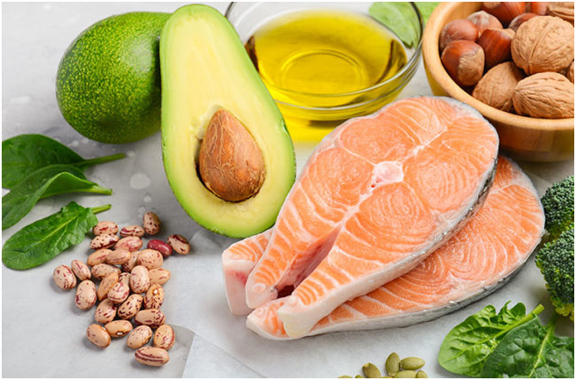
Your body needs some cholesterol to work properly. But if you have too much in your blood, it can stick to the walls of your arteries and narrow or even block them. This puts you at risk for coronary artery disease and other heart diseases. Cholesterol travels through the blood on proteins called lipoproteins. One type, LDL, is sometimes called the “bad” cholesterol. A high LDL level leads to a buildup of cholesterol in your arteries. Another type, HDL, is sometimes called the “good” cholesterol. It carries cholesterol from other parts of your body back to your liver. Then your liver removes the cholesterol from your body.
Choose healthier fats
You should limit both total fat and saturated fat. No more than 25 to 35% of your daily calories should come from dietary fats, and less than 7% of your daily calories should come from saturated fat.
Eat lots of fruits and vegetables
A diet rich in fruits and vegetables can increase important cholesterol-lowering compounds in your diet. These compounds, called plant stanols or sterols, work like soluble fiber.
Eat fish high in omega-3 fatty acids
These acids won’t lower your LDL level, but they may help raise your HDL level. They may also protect your heart from blood clots and inflammation and reduce your risk of heart attack. Fish that are a good source of omega-3 fatty acids include salmon, tuna (canned or fresh), and mackerel. Try to eat these fish two times a week.
Limit salt
You should try to limit the amount of sodium (salt) that you eat to no more than 2,300 milligrams (about 1 teaspoon of salt) a day. That includes all the sodium you eat, whether it was added in cooking or at the table, or already present in food products. Limiting salt won’t lower your cholesterol, but it can lower your risk of heart diseases by helping to lower your blood pressure. You can reduce your sodium by instead choosing low-salt and “no added salt” foods and seasonings at the table or while cooking.
Limit alcohol
Alcohol adds extra calories, which can lead to weight gain. Being overweight can raise your LDL level and lower your HDL level. Too much alcohol can also increase your risk of heart diseases because it can raise your blood pressure and triglyceride level.


Be the first to comment